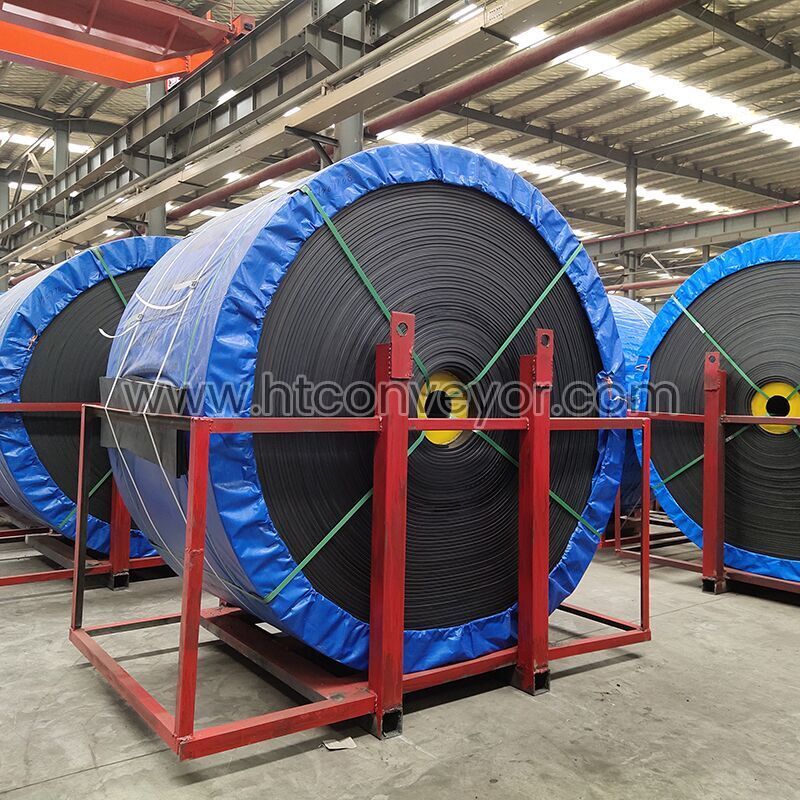Introduction:
In the world of industrial processes, the importance of efficient material handling cannot be overstated. Whether it's in mining, manufacturing, or logistics, the ability to move materials reliably and swiftly is essential. Rubber conveyor belts have emerged as one of the most vital tools in this domain. Combining durability, flexibility, and versatility, these belts have revolutionized material transport systems. This article delves into the world of rubber conveyor belts, exploring their construction, advantages, and diverse applications.
Construction and Components:
Rubber conveyor belts are constructed using layers of rubber, fabric, and various reinforcing materials, depending on the specific application requirements. The core of the belt consists of fabric layers made of polyester, nylon, or cotton, which provide tensile strength and stability. The rubber layers surround the fabric, protecting it from wear and tear and providing a smooth surface for material transport. To enhance the belt's durability, additional components such as cover compounds, edge reinforcements, and impact-absorbing layers are often incorporated.
Advantages of Rubber Conveyor Belts
Durability: Rubber conveyor belts are designed to withstand heavy loads, abrasive materials, and harsh environments. The combination of tough rubber and sturdy fabric layers ensures a long service life, reducing downtime and maintenance costs.

Flexibility: Rubber belts can be fabricated in various widths, lengths, and thicknesses, making them adaptable to different equipment and operational requirements. Their flexibility allows them to navigate curves, inclines, and declines smoothly, optimizing material flow.
High Traction: The rubber surface of conveyor belts offers excellent grip, ensuring minimal slippage during material transport. This feature is crucial in applications where maintaining precise speed and control is essential, such as in incline or decline conveyors.
Cost-Effective: Rubber belts are a cost-effective solution due to their durability, minimal maintenance needs, and energy efficiency. They can handle large volumes of materials, contributing to increased productivity and reducing labor costs.
Applications of Rubber Conveyor Belts:
Mining: Rubber conveyor belts are extensively used in mining operations for the transportation of coal, ore, minerals, and aggregates. Their robust construction and resistance to chemicals, oils, and heat make them ideal for rugged mining environments.
Manufacturing: In manufacturing industries, rubber belts facilitate the movement of raw materials, components, and finished products across production lines. They are widely employed in automotive, food and beverage, pharmaceutical, and electronics industries, among others.
Logistics and Distribution: Conveyor belts play a vital role in warehouses, distribution centers, and airports. They efficiently transport packages, parcels, and luggage, ensuring smooth logistics operations and minimizing manual handling.
Agriculture: Hengtuo Rubber belts are used in agricultural applications for handling crops, grains, and seeds. They facilitate the movement of harvested materials from one location to another, enhancing efficiency during the sorting, cleaning, and packaging processes.
Recycling: Conveyor belts are integral to recycling plants, facilitating the transportation of various recyclable materials, including plastics, glass, metals, and paper. They contribute to streamlining the sorting and processing stages, enabling effective resource recovery.
Conclusion:
Rubber conveyor belts have revolutionized material handling across industries, offering durability, flexibility, and reliability. From mining to manufacturing, logistics to agriculture, these belts ensure the efficient and safe movement of materials. Their versatility and ability to withstand demanding conditions make them indispensable in modern industrial processes. As technology advances, rubber conveyor belts continue to evolve, incorporating innovative materials and designs to meet the ever-increasing demands of global production and transportation.
619
0
0
All Comments (0)
Previous: Rubber Conveyor Belt: A Backbone of Industrial Efficiency
Next: Enhancing Safety and Quality Control: The Glove Leak Detection Machine
If you are interested in sending in a Guest Blogger Submission,welcome to write for us!
Comments